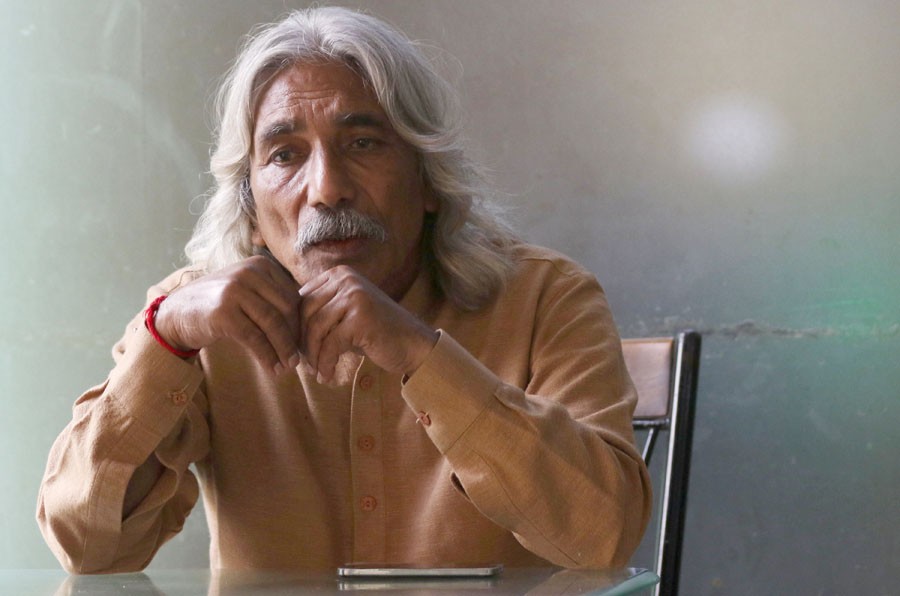
Punjabi poet Baba Najmi is feted by the literati and loved by his fans, for being a liberal and enlightened voice. His personal life, though, has been one "emotional roller-coaster" ride

"I am not just a poet but also a labourer and an active trade unionist. So, don’t expect me to sing to Nature or the fairer sex while Rome burns," says the sexagenarian Baba Najmi, dubbed as the "People’s Poet" by the literati on both the Indian and Pakistani Punjabs.
"Through my verses, I try to raise my voice against every form of injustice, exploitation, and other problems faced by the common people."
For him, poetry is a clarion call against usurpers and their sidekicks. He has travelled through the length and breadth of the country to attend various poetry recitals where his verses earned him great applause every single time. In an exclusive meeting with TNS, Najmi looks back at what he calls a roller-coaster emotional ride that his life has been -- as a poet, a "labourer," a trade unionist, a political activist, and a campaigner of Punjabi language.
Real name Bashir Hussain, Najmi was born in Lahore in September 1948, into a poor family. He was drawn to written word at a very young age; he would study verses of the likes of Mir, Ghalib, and Iqbal at any library he could access. Financial constraints pushed him to start an odd job as a clerk, in a film company named Ravi Films, when he was only 20. The company had a few hit films to its credit such as Mirza Jutt, Chan Sajna, Sohna Puttar, Nikay Hondeyan Da Pyar etc. However, one feature, titled Mera Naa Patay Khan, which was expected to be a big hit, had turned out to be a box office disaster. "The company was bankrupted and so was I, because I had invested my entire savings on the film hoping it to be a blockbuster," he says.
Thus, his eight-year-long stint with the local film industry came to an end in 1976. Left virtually a pauper, Najmi ran here and there looking for work, but to no avail. He moved to Karachi in 1977, and found vocation in car-washing at a vehicles’ market on Bunder Road. "I would sit on the road, endlessly waiting for customers to arrive," he recalls, with a tinge of sadness. "I’d wash and polish their cars."
During his stay in Karachi, until 2008, he began to compose poetry in Punjabi, and quickly made friends with Fehmida Riaz, Habib Jalib, Zahida Hina, and Mehmood Sham who praised his liberal and enlightened thought. Aside from toiling at the auto service station, he now began to visit the Karachi Press Club that attracted him to take part in trade union activities also. Najmi became a familiar figure.
In the meantime, his anthology, titled Aakhran Vich Samundar, was published from Karachi; it had foreword by Fehimda Riaz. Three more books followed, namely Sochan Vich Jahan, Mera Naa Insan, and Sarka Rama. His books created quite a furore in the Indian Punjab also, and had countless reprints in Gurmukhi script. So much so that he was labelled "sanjhay punjab da lok kavee," (the people’s poet of both the Punjabs).
He remember how on his visit to the Indian Punjab, he "was showered with so much love and adulation that I can’t describe in words." Recently, he was invited to visit five cities in Canada by the local Punjabi community.
Najmi also has the honour of being perhaps the only living Punjabi poet whose bust has been placed at a par named after Bhagat Singh in Moga, a city in Indian Punjab. He says he couldn’t meet the fan who made the statue. "Somebody told me about Manjeet Singh Gill who made it. I was pleasantly surprised to know that. Later, I spoke to him [Gill] on the phone, and he told me that it was his tribute to my poetry."
Although the canvass of Baba Najmi’s poetry is criticised for not being too diverse, he doesn’t care about it. For him, his poetry is a tool with which he takes to task the usurpers, religious fundamentalists, hate mongers and so on. "I’ve been doing that all my life, and am determined to do it to my last breath," he declares.